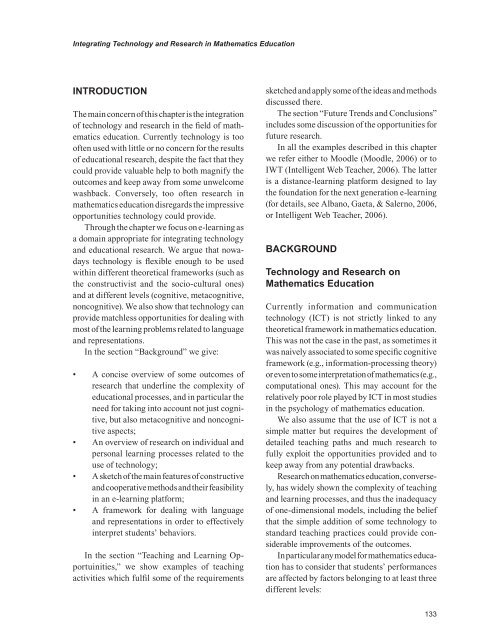Advances in E-learning-Experiences and Methodologies
You also want an ePaper? Increase the reach of your titles
YUMPU automatically turns print PDFs into web optimized ePapers that Google loves.
Integrat<strong>in</strong>g Technology <strong>and</strong> Research <strong>in</strong> Mathematics Education<br />
IntroductIon<br />
The ma<strong>in</strong> concern of this chapter is the <strong>in</strong>tegration<br />
of technology <strong>and</strong> research <strong>in</strong> the field of mathematics<br />
education. Currently technology is too<br />
often used with little or no concern for the results<br />
of educational research, despite the fact that they<br />
could provide valuable help to both magnify the<br />
outcomes <strong>and</strong> keep away from some unwelcome<br />
washback. Conversely, too often research <strong>in</strong><br />
mathematics education disregards the impressive<br />
opportunities technology could provide.<br />
Through the chapter we focus on e-learn<strong>in</strong>g as<br />
a doma<strong>in</strong> appropriate for <strong>in</strong>tegrat<strong>in</strong>g technology<br />
<strong>and</strong> educational research. We argue that nowadays<br />
technology is flexible enough to be used<br />
with<strong>in</strong> different theoretical frameworks (such as<br />
the constructivist <strong>and</strong> the socio-cultural ones)<br />
<strong>and</strong> at different levels (cognitive, metacognitive,<br />
noncognitive). We also show that technology can<br />
provide matchless opportunities for deal<strong>in</strong>g with<br />
most of the learn<strong>in</strong>g problems related to language<br />
<strong>and</strong> representations.<br />
In the section “Background” we give:<br />
• A concise overview of some outcomes of<br />
research that underl<strong>in</strong>e the complexity of<br />
educational processes, <strong>and</strong> <strong>in</strong> particular the<br />
need for tak<strong>in</strong>g <strong>in</strong>to account not just cognitive,<br />
but also metacognitive <strong>and</strong> noncognitive<br />
aspects;<br />
• An overview of research on <strong>in</strong>dividual <strong>and</strong><br />
personal learn<strong>in</strong>g processes related to the<br />
use of technology;<br />
• A sketch of the ma<strong>in</strong> features of constructive<br />
<strong>and</strong> cooperative methods <strong>and</strong> their feasibility<br />
<strong>in</strong> an e-learn<strong>in</strong>g platform;<br />
• A framework for deal<strong>in</strong>g with language<br />
<strong>and</strong> representations <strong>in</strong> order to effectively<br />
<strong>in</strong>terpret students’ behaviors.<br />
In the section “Teach<strong>in</strong>g <strong>and</strong> Learn<strong>in</strong>g Opportu<strong>in</strong>ities,”<br />
we show examples of teach<strong>in</strong>g<br />
activities which fulfil some of the requirements<br />
sketched <strong>and</strong> apply some of the ideas <strong>and</strong> methods<br />
discussed there.<br />
The section “Future Trends <strong>and</strong> Conclusions”<br />
<strong>in</strong>cludes some discussion of the opportunities for<br />
future research.<br />
In all the examples described <strong>in</strong> this chapter<br />
we refer either to Moodle (Moodle, 2006) or to<br />
IWT (Intelligent Web Teacher, 2006). The latter<br />
is a distance-learn<strong>in</strong>g platform designed to lay<br />
the foundation for the next generation e-learn<strong>in</strong>g<br />
(for details, see Albano, Gaeta, & Salerno, 2006,<br />
or Intelligent Web Teacher, 2006).<br />
BAckground<br />
technology <strong>and</strong> research on<br />
mathematics education<br />
Currently <strong>in</strong>formation <strong>and</strong> communication<br />
technology (ICT) is not strictly l<strong>in</strong>ked to any<br />
theoretical framework <strong>in</strong> mathematics education.<br />
This was not the case <strong>in</strong> the past, as sometimes it<br />
was naively associated to some specific cognitive<br />
framework (e.g., <strong>in</strong>formation-process<strong>in</strong>g theory)<br />
or even to some <strong>in</strong>terpretation of mathematics (e.g.,<br />
computational ones). This may account for the<br />
relatively poor role played by ICT <strong>in</strong> most studies<br />
<strong>in</strong> the psychology of mathematics education.<br />
We also assume that the use of ICT is not a<br />
simple matter but requires the development of<br />
detailed teach<strong>in</strong>g paths <strong>and</strong> much research to<br />
fully exploit the opportunities provided <strong>and</strong> to<br />
keep away from any potential drawbacks.<br />
Research on mathematics education, conversely,<br />
has widely shown the complexity of teach<strong>in</strong>g<br />
<strong>and</strong> learn<strong>in</strong>g processes, <strong>and</strong> thus the <strong>in</strong>adequacy<br />
of one-dimensional models, <strong>in</strong>clud<strong>in</strong>g the belief<br />
that the simple addition of some technology to<br />
st<strong>and</strong>ard teach<strong>in</strong>g practices could provide considerable<br />
improvements of the outcomes.<br />
In particular any model for mathematics education<br />
has to consider that students’ performances<br />
are affected by factors belong<strong>in</strong>g to at least three<br />
different levels:


